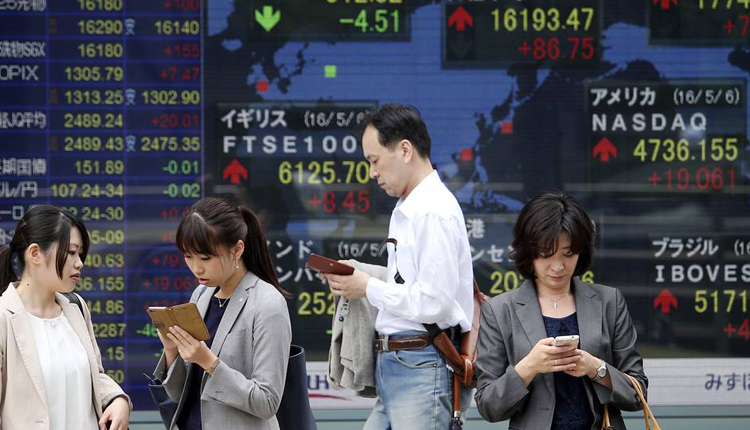Asian stocks mostly jumped on Wednesday, as news overnight boosted Brexit optimism.
Japan’s Nikkei 225 jumped 1.29 percent. Sectors across the board did well, with autos, tech and retail carving out significant gains. In South Korea, the Kospi rose 0.59 percent.
South Korea’s central bank cut its interest rate for the second time in three months on Wednesday, as expected, following its first cut in July.
Mainland Chinese stocks declined in afternoon trade, with the Shanghai composite down 0.23 percent and the Shenzhen component fractionally lower.
Hong Kong’s Hang Seng index rose 0.39 percent after fresh political unrest in the city, where embattled leader Carrie Lam was heckled by pro-democracy lawmakers in parliament.
Lam had to deliver her annual policy address via video after being interrupted twice. The focus of her speech was on land and housing initiatives — seen as bids to restore confidence in Hong Kong following months of anti-government protests that have dampened business confidence in the city.
Australia’s S&P/ASX 200 rose 1.27 percent to 6,736.50. The heavily weighted financial subindex was up 1.51 percent, with banks seeing gains.
Meanwhile, the listing of Australian lender Latitude Financial — what was to be the biggest Australian IPO of the year — has been canceled, according to a Reuters report, citing sources.
U.S. private equity firm KKR, Deutsche Bank and Varde Partners decided to cancel the expected A$1 billion ($676.20 million) offering, because a large proportion of demand for shares was coming from hedge funds rather than desired long-term investors, the report said.
A company spokesman declined to comment to Reuters, but said Latitude expects to make an announcement on Wednesday.
Meanwhile, Brexit hopes were buoyed by news that the EU and the U.K. were close to a deal. The sterling spiked to a four-month high after optimistic comments from European negotiator Michel Barnier, with reports that a draft legal text was being drawn up.
The sterling was last at 1.2760 against the dollar, climbing from an earlier low of 1.2736.
But analysts say that markets could be overly optimistic, not taking into account a warning by the International Monetary Fund on Tuesday that the U.S.-China trade war will cut 2019 global growth to its slowest pace since the 2008-2009 financial crisis.
“It appears that markets brushed aside dire warnings from the IMF, instead focusing on the (relatively) bright side; be it ‘Brexit’ positives, milder Turkish sanctions, and simply just avoiding US-China meltdown,” Mizuho Bank’s Head of Economics and Strategy Vishnu Varathan wrote in a note. He was referring to the U.S.-China trade war.
In Hong Kong news, nine of its biggest banks are set to meet the city’s de facto central bank on Wednesday to discuss ways to help companies find financing to survive an expected downturn, according to a SCMP report.
The city’s economy has slumped amid protracted demonstrations that have gone on for months and turned increasingly violent.
Sentiment stateside was lifted, however, by corporate earnings, which got off to a strong start. Of the 34 S&P 500 companies which reported third-quarter numbers, 29 topped analyst expectations.
The Dow Jones Industrial Average rose 237.44 points, or 0.9 percent to close at 27,024.80, while the S&P 500 gained 1 percent to close at 2,995.68, making it about 1 percent from an all-time high, and the Nasdaq Composite advanced 1.2 percent to 8,148.71.
Currencies and oil
The U.S. dollar index, which tracks the greenback against a basket of its peers, was last at 98.306, easing from an earlier high of 98.364.
The Japanese yen traded at 108.66, weakening from levels around 108.37 earlier in the week. The Australian dollar changed hands at $0.6731 following a low of $0.6724 seen earlier.
Oil prices rose during Asian trading hours, with international benchmark Brent crude futures up 0.2 percent at $58.86 per barrel. U.S. crude futures rose 0.19 percent to $52.91 per barrel.
Source: CNBC
